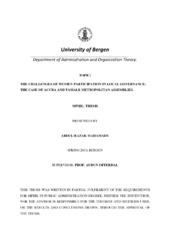| dc.description.abstract | The woman in Ghana hews the wood, carries the water, satisfies the man, produces and takes care of the child to continue the family tree and manages all house chores. All these are justifications that she can be put in a position of trust and responsibility since society treasures the valuable services she provides. Embarrassingly, she is absent when it comes to the area of representing her locality or community to make decisions in the local council. Is she only good in family management and not that of the larger community where the man she serves has an almost automatic and comfortable position? There is no denying the fact that democracy is appreciated all over the world because of the opportunity it provides for the participation of various interest groups in the management of societal affairs. It is reasonable to argue, therefore, that participation in decision making will be severely hindered when a good number of females are not elected or appointed into the local assemblies.Indeed, there is truly a large constituency of women out there who are largely unrepresented and, therefore, have no idea how governance is conducted even around them. This is unfair especially in jurisdictions where women are clearly in the majority. It's impermissible that some assemblies in Ghana have over a decade recorded only a single elected female member against too many males. As a result, this study seeks to explore the issue of women representation in Ghana through a comparison of two assemblies using qualitative data and statistics of female councilors from 1994 to 2006 in order to assess the factors that may be accountable for their small numbers as compared to their male counterparts.Various theories bordering on recruitment like the individual supply and demand theory', Prewitt's Chinese box puzzle and Norris' assessment of individual and institutional factors influencing recruitments would be employed. Variables including ambition, motivation, individual financial resources, gender, education, quotas, membership in organizations and family status or background that have the potential of impacting on recruitment of councilors will be assessed. How these variables mentioned above will specifically affect both male and female recruitments into assemblies of the two metropolitan areas located in opposite parts of the country (Ghana) would be explored. The two metropolitan areas within which the assemblies are situated have significant socio-economic and cultural differences and it would be interesting to see the extent to which these differences play out in the election and appointments of both male and female councilors into the local councils or assemblies | en_US |
